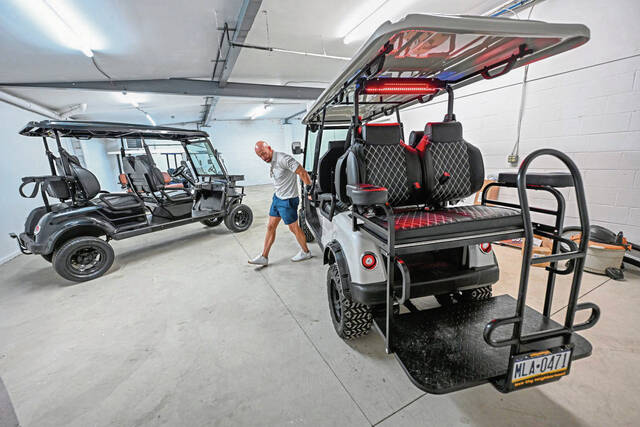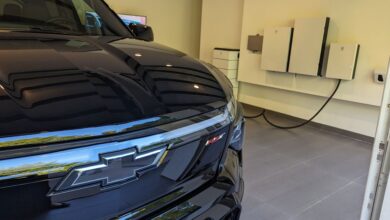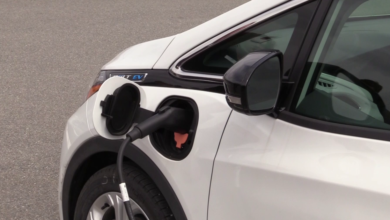Golf cart confusion and the rise of neighborhood electric vehicles

When Kevin Santelli drives what looks like a souped-up golf cart around town, people stop and stare.
They notice at the grocery store, the YMCA and restaurants near his Sewickley Heights home.
If he stays on roads with speed limits below 25 mph, he can go anywhere he’d like.
“It saves me from putting miles on my car when I’m just running errands around town,” Santelli said. “It does get a lot of looks.”
Six years have passed since Pennsylvania permitted neighborhood electric vehicles to hit the road — a concept defined separately from golf carts in the transportation code — but they’re only starting to catch on in Western Pennsylvania.
These street-legal carts include turn signals, a speedometer, seat belts and other trappings of a car.
They must be registered, insured and operated by licensed drivers, though inspections
aren’t required. Driving under the influence is prohibited.
They can’t be designed to go faster than 25 mph. Though their use is restricted to roads posted with that speed limit or lower, municipalities can tweak the rules.
Local authorities may permit the use of these vehicles on roads under their jurisdiction posted up to 35 mph or prohibit their use where they see fit.
Matthew Simmons sells them at Village Buggy in Leet. The dealership opened in March and has sold nearly 40 carts to date. Folks from neighboring communities, such as Sewickley Heights, have given him business, but he’s also had customers from Mt. Lebanon, Murrysville and other areas.
Jeremy Ostergard, sales manager at Golf Carts Unlimited in Scott, added Cranberry and Fox Chapel to that list. His dealership sells a mix of conventional golf carts and neighborhood electric vehicles.
Simmons strictly sells the latter in about the $10,000 to $15,000 range. Buyers can customize their rides with stereo systems, touchscreen displays and heaters. For hills, Simmons recommends opting for a lithium battery over a conventional one.
In short, these are a far cry from a basic beige golf cart, but not everyone is familiar with the distinction.
Santelli and other neighborhood electric vehicle users who spoke with TribLive weren’t even aware of a difference between golf carts and neighborhood electric vehicles until recently.
Golf carts are exempt from registration and certain safety features in Pennsylvania. They can be used only on golf courses, resorts and educational campuses.
Within the transportation code, there’s an obscure provision that allows golf carts to travel within 1 mile of their home properties on public roads if the adjacent land is owned by one of those entities.
Children ages 12 to 16 are permitted to get behind the wheel alone where golf carts are allowed, as long as they avoid highway crossings.
Allegheny Township police Chief Dan Uncapher said families are misinterpreting this law and giving their children unsupervised access to golf carts.
Local officials say the problem is concentrated in the township’s Melwood plan.
“My biggest concern here is the safety and well-being of our community,” Uncapher said. “I don’t want to see anybody of any age get hurt on a golf cart.”
No injuries have been reported to township police, but an accident isn’t outside the realm of possibility.
Children’s Hospital of Philadelphia researchers found in 2021 that more than 6,500 children are hurt by golf carts each year. The team cited more permissive golf cart laws as part of their rationale for the study.
Superficial injuries were most common, followed by fractures and dislocations.
Uncapher also stressed that police can and will pull over golf carts that are breaking the law. The same would apply to neighborhood electric vehicles, though they haven’t really hit Allegheny Township.
“That’s obviously not something we’d like to do to a kid,” Uncapher said.
While underage kids driving neighborhood electric vehicles isn’t allowed under any circumstances, they could offer a taste of freedom once they hit 16.
Shelly Meyers of Mt. Lebanon, who bought a six-seater from Village Buggy a month or two ago, already has a plan for her three kids.
“Our kids are still a few years away from it, but we’ve talked about it already — what a way to teach kids how to drive and take care of something, and we’ll know they’re not going faster than 25 mph,” Meyers said.
Jack Troy is a TribLive reporter. A Pittsburgh native, he joined the Trib in January 2024. He can be reached at jtroy@triblive.com.



